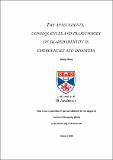The antecedents, consequences and trajectories of shared identity in emergencies and disasters
Abstract
Group processes in emergencies and disasters have been studied for decades by psychologists, and they have developed many theories to explain collective behaviours. One of the most recent and reasonable theoretical frameworks is the social identity model. The social identity model posits that it is the shared social identity that underpins various group behaviours, especially solidary behaviours, which were widely observed and reported in previous research. While there was abundant research showing that validated the social identity approach, there were still many questions unanswered. The present research sought to answer three general questions: (1) can the social identity model of collective behaviours in emergencies and disasters be applied in a non-Western background? (2) how does shared identity develop over time? (3) what factors may enhance or undermine the strength of shared identity?
Four studies were designed to answer these questions. Study 1 and study 2 were two field studies adopting an ethnographic approach. They sought to explore the research questions in general, but in two different settings – one about an earthquake in China, and the other about a flood in Ireland. By comparing the results of the two field studies, four factors that might influence shared identity were identified, and they were explored in lab experiments in study 3 and study 4.
Together, these studies have shown that: (1) the social identity model was useful in China and Ireland, and in an earthquake and a flood; (2) the trajectory of social identity could be short or long, and it could develop into several different subtypes, however, it did not seem to be a consequence of time per se, rather, it was caused by shared fate or shared memory; (3) severity of disaster, pre-existing unity, observed unity, and time were all found to have influenced the level of shared identity.
Type
Thesis, PhD Doctor of Philosophy
Collections
Items in the St Andrews Research Repository are protected by copyright, with all rights reserved, unless otherwise indicated.

